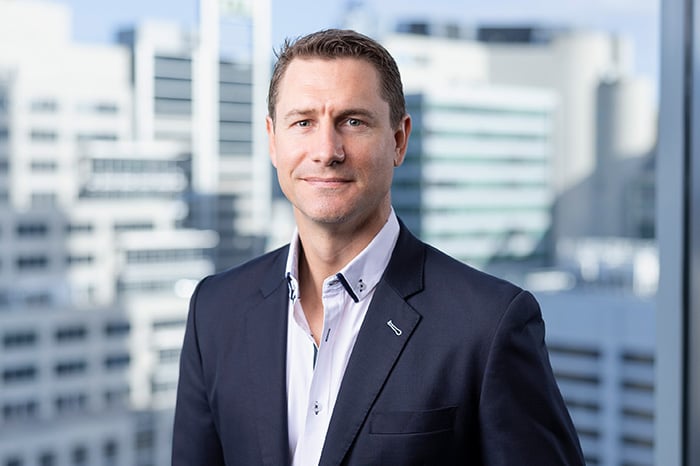Wes Rose is a partner in the Property, Energy & Infrastructure team and was recently appointed to lead Wotton Kearney’s construction practice. His expertise spans the construction and infrastructure, property, energy, transport, manufacturing, and agriculture sectors.

Tell us about your journey to becoming a partner at Wotton Kearney.
I joined Wotton Kearney almost exactly 4 and a half years ago, along with my team of nine. Prior to joining, I was a partner at what might be described as a “very traditional” law firm. It’s fair to say I was swimming against the tide in that environment. Wotton Kearney saw that and approached me about coming on board. What drew me to the firm was the unwavering entrepreneurial spirit and a culture of real collaboration and group effort, which is genuinely baked into the firm’s DNA – the practice of law at Wotton Kearney is a team sport.
When me and my team joined Adam Chylek’s crew in the then Property & Energy group back in August 2020, we were two Sydney-based partners and 13 lawyers. Since then, we’ve rebadged to the Property, Energy & Infrastructure group and, in just four or so years, have grown to seven partners and more than 60 lawyers nationally, as well as specialist PE&I teams in New Zealand and Singapore. It’s been a pretty amazing ride to this point, but our ambition isn’t finite and the creation of the Construction sector team at Wotton Kearney is the next chapter in our growth story.
You were recently appointed Head of Construction. What are your primary goals and priorities in your new role?
One of my main priorities is to harness the exceptional talent we have across the firm to create a seamless, integrated service for our clients in the construction sector. We have market-leading experts specialising in everything from WHS prosecutions to material damage incidents, defects and design claims, and regulatory issues. My goal is to ensure that our clients have effortless access to this wealth of expertise. If, for example, there’s an incident on a construction site, I want to make it so that with just one call, our clients can tap into our powerhouse of knowledge and secure a tailored solution to address any issue they face on a project.
“By bringing our top minds together, we’re not just responding to problems in a holistic way – we’re also anticipating them, ensuring our clients stay ahead of the curve in a complex sector.”
What do you see as the biggest challenges and opportunities in the construction sector at the moment?
This is such a great question but the answer isn’t a simple one – you could probably write a textbook on the challenges facing the construction sector in the post-pandemic world. That said, if I had to distil it down to just a couple of key issues, I’d say price pressures driven by supply chain problems and trouble accessing skilled labour, coupled with increasingly complicated projects using often novel products in difficult and remote places, would have to be close to the top of the list of challenges.
Take the renewables race, for instance – Snowy 2.0 is a prime example of the hurdles the industry is facing. We’re also seeing solar and wind generation assets being built in more challenging environments, from difficult terrains to offshore locations. This introduces a whole new set of risks for everyone involved – from principals to contractors and designers. But within these challenges lie tremendous opportunities. Those who can navigate these complexities and innovate in response will be the ones who set the new standard for the industry.
It’s not all bad news, though. For operators with strong risk management practices, solid financial foundations, and strategic guidance, these challenging conditions present a real opportunity. Those who handle incidents and disputes with care and foresight will not only navigate the storm – they’ll emerge stronger, as the market inevitably weeds out the less resilient players. In the end, those who are well-prepared and well-advised will find themselves leading the pack.
“Those who can navigate these complexities and innovate in response will be the ones who set the new standard for the industry.”
What made you decide to become a lawyer?
I’ve always loved solving tricky problems and it’s really what I’ve known all my life. I spent much of my early life on farms, and when you’re in remote locations and issues arise, no one’s coming to help you, you just have to be resourceful and work things out yourself. It was similar when I started working in construction after I finished school – it’s inevitable that problems arise on projects and you just have to knuckle down and work out a way around them. To me, that’s what good lawyers are – not just legal advisors, but professional problem solvers, and that’s what I get to do every day.
What’s the best piece of advice (work or personal) you’ve been given?
Always tell the truth and be brave enough to tell people what they need to hear, not what they want to hear.
What do you get up to outside of work?
My wife and I have a farm and we split our time between there and the city. You’ll inevitably find me in the paddock somewhere – it’s where I’m happiest, normally taking the dogs for a walk where they get to chase after rabbits or point at quail in the long grass, or I might be feeding the cows, cutting firewood or fixing fences.
Complete this sentence: if I wasn’t a lawyer, I would be…
…in far North Queensland working on a cattle station.